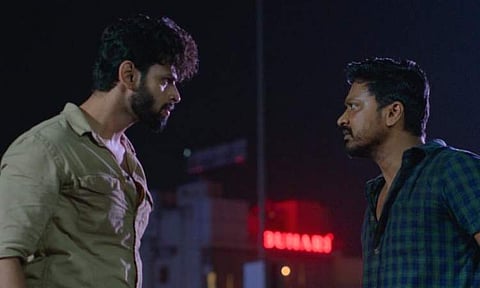

Perhaps the foremost problem plaguing action films in our cinema is the inability to establish the protagonist as someone who can be injured, who can be felled. When stars begin fighting adversaries—even if by the hundreds—you know it’s all safe and that they will all soon be exterminated in rope fights. Even in a film like Joshua Imai Pol Kaakha that doesn’t have a star at its centre, sure, we do expect Joshua to be winning battles, but what I found to be such a relief was seeing him suffer as well. Action is best enjoyed when you buy the illusion that both parties can hurt—and in his latest film, Gautham Menon shows Joshua reeling in many ways. He can often be seen yelling in pain and agony. When he throws a pan full of hot oil at an adversary, he is able to do it because of the adrenaline, but soon as the enemy is defeated, he screams in discomfort. In fact, his grievous injury even needs medical attention, and the film establishes that he spends a few days recovering. He’s later stitched up and there’s a small combat scene that begins with a doctor being there to remove his stitches. At one point, he’s even on the cusp of death (perhaps that’s why we can forgive him that uncharacteristically soft expression of love when he goes, “Un madila saagaren.”). This lack of invincibility from a protagonist meant that I was more invested in the combat scenes than in your regular film.
Director: Gautham Menon
Cast: Varun, Raahei, Krishna
The action set-pieces themselves are treated with impressive urgency. I don’t remember seeing hero-worshipping slow-mo shots; I don’t remember thinking Joshua was having it all too easy. Varun’s body-language—and impressive physique—aids in registering the chaos of these fights. He’s quiet and calm one moment, but soon as he senses a threat coming in, he turns into the equivalent of… an angry rottweiler. He’s charged up in the presence of danger—until his beloved is safe again. In one scene, when Joshua believes he has failed to protect her and has lost her, I laughed in enjoyment at how manic he is, as he runs to and fro with no plan—until his friend makes him freeze on his tracks by telling him her whereabouts.
Karthik’s music—as with music in any Gautham Menon film, I suppose—is a definite strength. I caught myself constantly tapping my foot to some enterprising music choices that accompany the fights. That energetic track when Joshua is counting as he’s putting bullets in heads. That ‘thagadhimi’ classical intervention as Joshua is fighting within the cramped confines of an SUV. That track that sounds like a racing heartbeat as Joshua is fighting in a hotel kitchen. There’s even time for a kuthu track as Joshua fights a friend at one point. I liked that the film keeps us guessing with its score selection—and each time, there is enough novelty to keep things kinetic.
While on the topic of guessing, this action film also doubles up as a bit of a mystery, as we don’t really know the identity of the villain. Is there one? Are there several? Could it be someone really close to Joshua? Could it be someone close to his beloved Kundhavi? The truth is, I’m not sure the film’s big strength is this reveal—or the characters being in conversation to figure this out. There is a red herring or two as well, but I think quite a bit of the figuring-out-of-this-puzzle flew over my head; I was quite content seeing Joshua and the film race between action set-pieces, taking a moment or two in between to breathe, now and then. This, anyway, isn’t a film about a hero fighting an anonymous villain; I saw this more as Joshua doing whatever it takes to keep Kundhavi breathing. Every person who stands in front of her with a weapon is a new villain. This is a film about Joshua being in such a hurry that he doesn’t even get time to find another pair of shoes. For a while, he’s barefooted everywhere, and when he does ask his associate (DD) for shoes, I laughed when she quips something along the lines of, “Amaa, idhayum tholaikka pora…”
And there’s just enough to make sure that things don’t get repetitive. I think that’s why the whole friendship angle between Joshua and Koti (Krishna) comes as a refreshing departure from everything until then. There is a hint of a flashback between them, but it doesn’t overstay its welcome—much like the film itself. Even with this friendship, there’s a bit of a guessing game going on—and I totally enjoyed the scene when Koti suffers a sudden change of heart during a car conversation.
Sure, I didn’t exactly see Kundhavi slaving away at her case, as you’d expect her to. Perhaps Varun is a lot more comfortable with the action than he is with the emotions. Perhaps I’d have liked to understand what about this relationship made Varun want to so quickly give up a job that he’s clearly so good at. And maybe Kundhavi doesn’t really come across as a particularly interesting personality (despite possessing a difficult job and using a gun at one point)—but there’s a case to be made that she’s strong too, given that she exercises the agency to walk off, follows through on the desire to see him again, and very much takes on a whole group of dangerous people by standing up for what’s right. She may come across as a ‘dependent’, but it is a film about her protector. It is about a man who’s saying, “Naan irukken; naan paathukaren.” And the film, at two hours and ten minutes, doesn’t allow you any time in which to dwell. At a time when filmmakers, especially the established ones, are going for bigger and bigger, it’s a relief to see one aim for something modest, something simple, something with no fluff—and pretty much deliver.